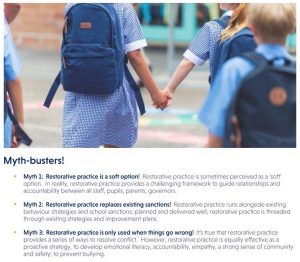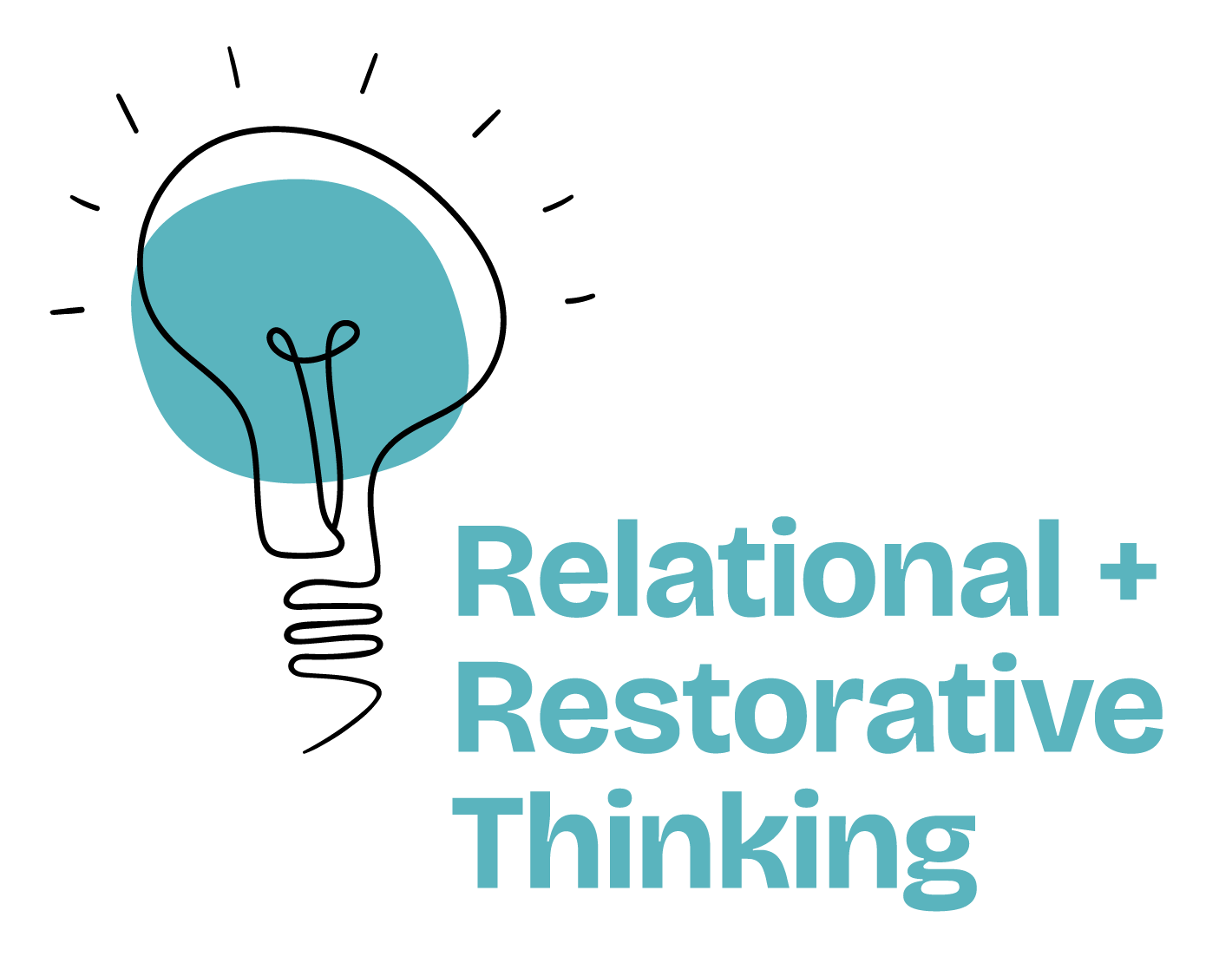Blended learning options to foster relational and restorative practice.
Schools
Drawing on relational and restorative practice to co-create solutions with all stakeholders.
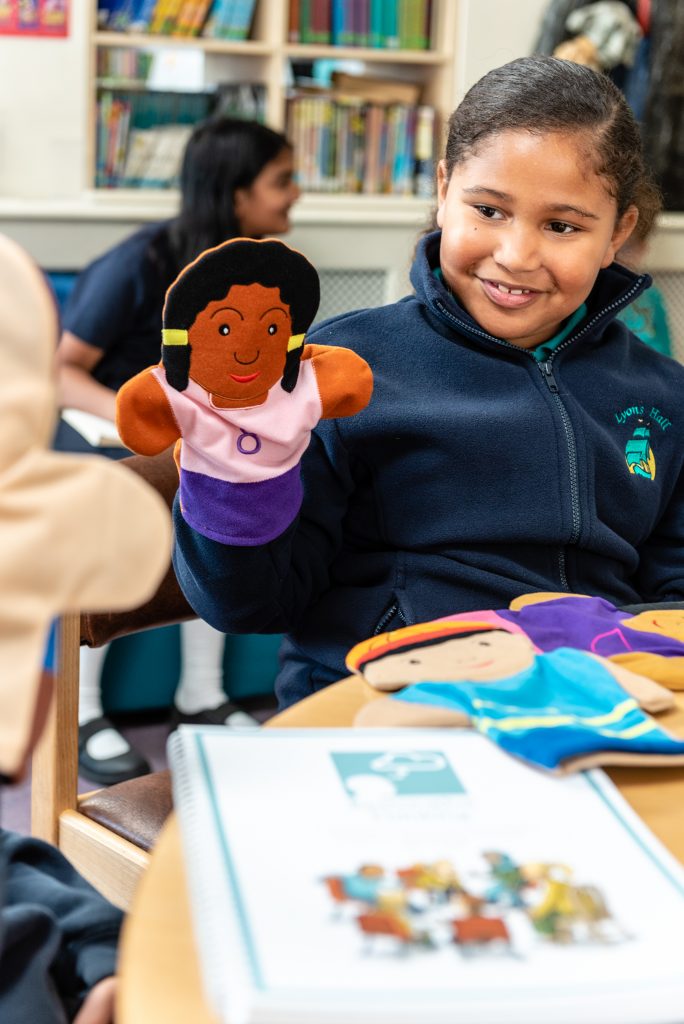
Solution-focused Collaboration
Relational and restorative practice places relationships at the heart of everything in your achievement agenda; it enables schools to bring different and sustainable solutions to long-standing pinch points, including behaviour, attendance, attainment, exclusions, bullying.
We help to introduce and embed relational and restorative practice, focusing on existing strengths and needs alongside intended outcomes.
We offer blended learning options, including flexible online CPD courses for primary, secondary and special schools. Please get in touch to explore how we can collaborate.
Scroll down this page to watch short videos about our collaborations with pupils, teachers and leaders.
“I have used my RP skills to help a student in Year 7.”

“It is essential that restorative thinking / practice is central to the ethos and running of the school. It will be an essential part of school improvement and behaviour development.”
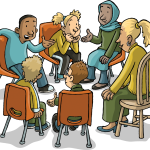
“Learning about the different sections of the brain helped me understand how my child might be feeling at a particular time.”
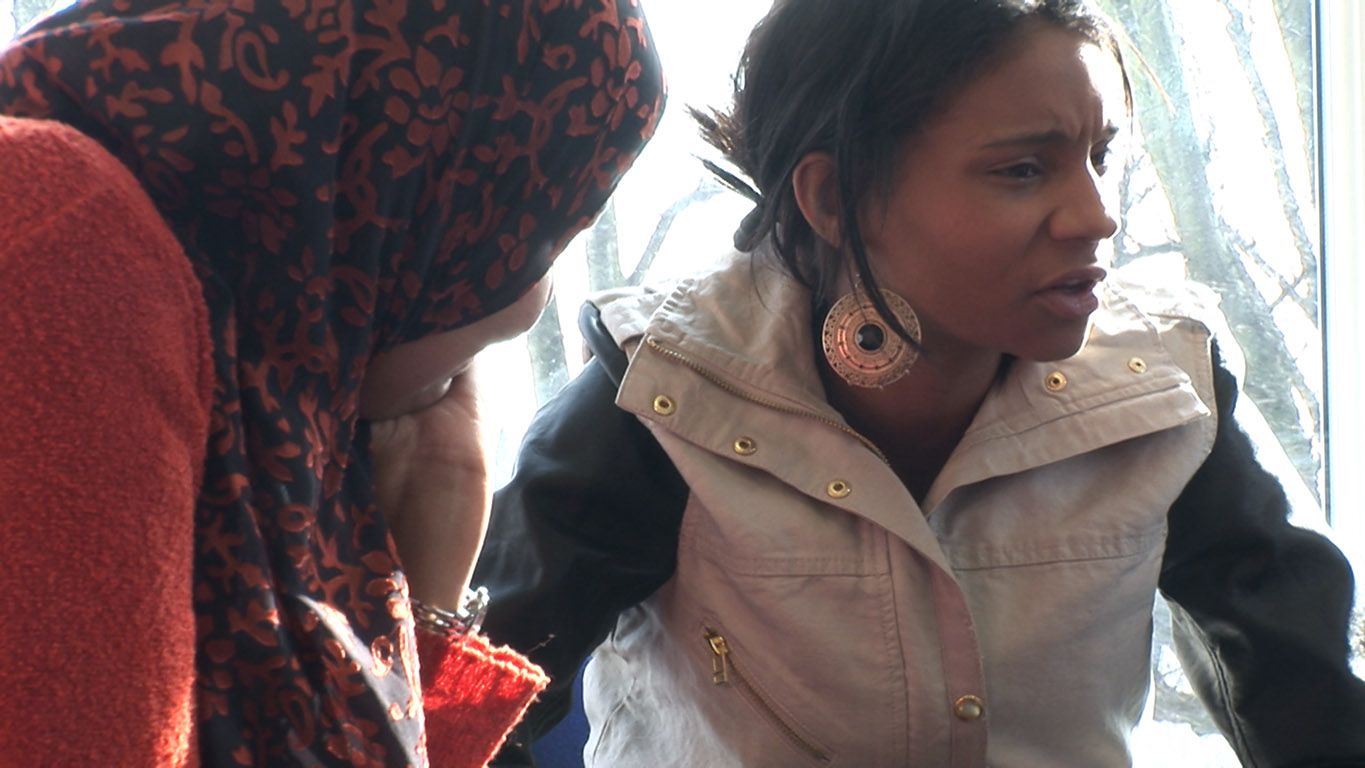
Online CPD courses for primary, secondary and special schools
We’ve co-produced online CPD courses with primary, secondary and special schools, to help introduce and embed restorative practice.
Watch this short video to find out more.
Fostering Restorative Practice in Schools
This e-learning course was produced with primary, secondary and special schools in Liverpool and is DfE-assured as part of their Senior Mental Health Lead training programme.
About the course
- 5 hours of online CPD
- Interactive information and insights: how to introduce and consolidate restorative principles and skills in your school
- Videos and interviews from the classrooms of primary, secondary and special schools to illustrate how restorative practice looks and feels in school settings
- Appeals to all learning styles: visual, auditory, kinaesthetic
- Downloadable worksheets and templates to use in the classroom and staffroom
- Return to the course an unlimited number of times
Contact us to enrol your school: lesley@restorativethinking.co.uk
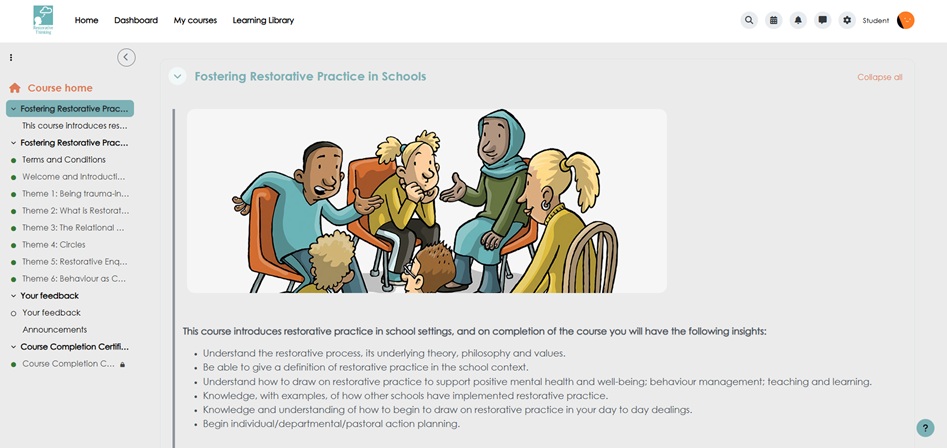
How we Engage
We provide engagement options to suit your timetable and budget.
We promote blended learning to meet specific needs, a combination of :
- Consultation
- e-Learning CPD
- Face to face training/coaching
- Zoom/Teams training/coaching
- Action Learning Sets
- Supervisions
- Self-guided study
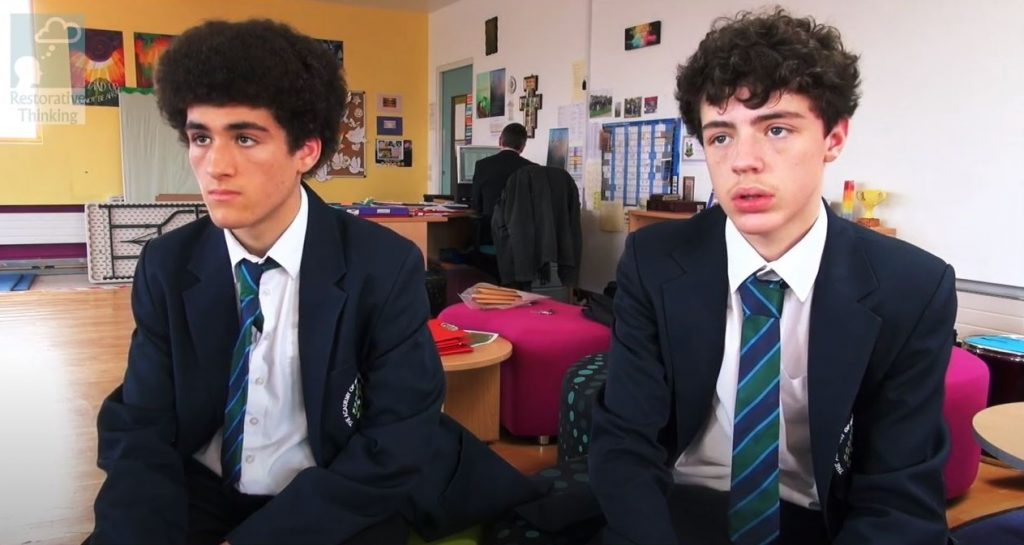
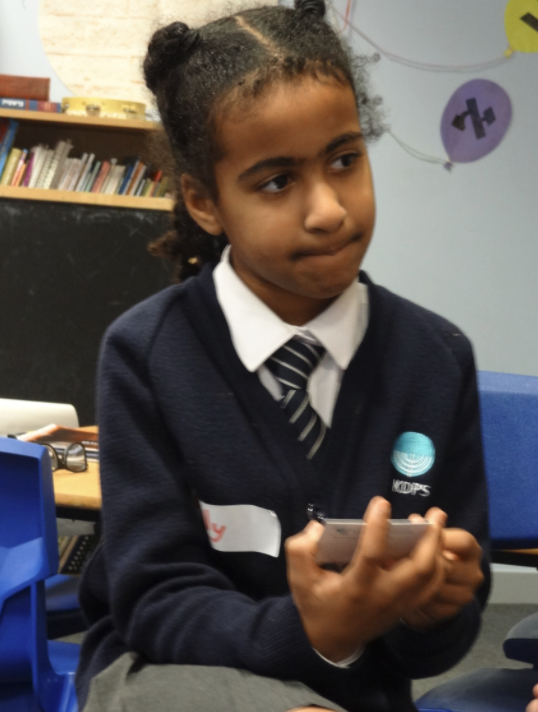
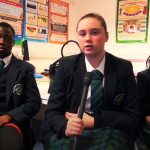
Outcomes with Schools
We’ve achieved some notable outcomes with primary, secondary and special schools, including:
- Positive mental health and well-being: talking about thoughts, feelings and behaviour, and strategies to manage strong or uncomfortable feelings, is normalised
- 50% reduction in staff absence over a 1-year period
- Staff CPD transfering to daily practice
- Reduction in fixed term and permanent exclusions
- Pupils reporting feeling safer at school
- Data to show improved attendance
- Data to confirm improved attainment across key stages
- Reduction in anti-social behaviour in and around school
- Parents/carers reporting improved relationships with school staff
Current and recent School projects
- 2025: e-learning programme ‘Fostering Restorative Practice in Schools’, with targeted support, used by primary, secondary and special schools to introduce and embed restorative practice.
- 2022: DfE grant funded senior mental health lead training. Online self-paced learning alongside real time peer learning.
- 2020-21: Trauma Informed Strategic Support for Merseyside Schools (Merseyside VRP).
- 2018 – 21: Working with the Families Team at Liverpool City Council and primary and secondary schools in Liverpool to implement whole school restorative and relational practice.
- 2015 – 17: Pilot to develop whole school restorative practice with Liverpool Schools. This project has been awarded the i-Network innovation award for ‘Transforming and Innovating Public Services’ (November 2018).
- 2012 – ongoing: Restorative Thinking curriculum programmes and training with schools in England, Wales and Scotland. Our primary curriculum programme has been awarded a Teach Primary Resource Award in the PSHE/Citizenship category (October 2018).
Senior Mental Health Leads Training – DfE Assured
Restorative Thinking’s e-Learning CPD course, ‘Fostering Restorative Practice in Schools‘, alongside targeted support with our team, has met the DfE quality criteria for grant funded senior mental health lead training.
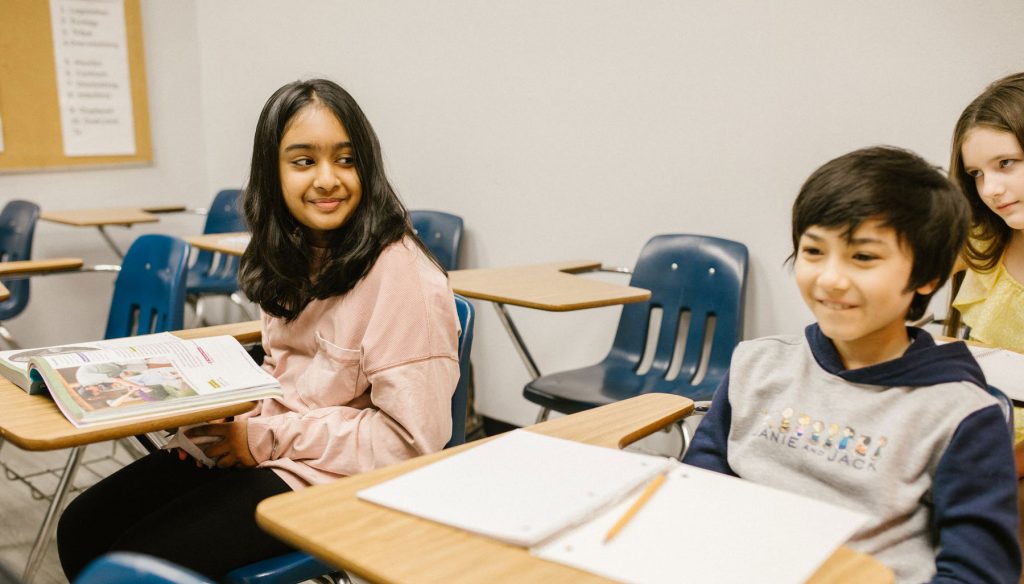
Anti-Bullying Alliance.
We work in partnership with the Anti-Bullying Alliance, producing resources and data to show the impact of restorative practice as an anti-bullying strategy. Follow this link to find out how we work together.
Award winning restorative practice project with Liverpool Schools

In 2015 Restorative Thinking (RT) was commissioned by Liverpool City Council (LCC) to undertake a restorative practice pilot with six schools in Liverpool, to implement whole school restorative practice. RT training, coaching and modelling with all six schools was needs-based and each school developed its own individual ‘road map’ for the two year pilot and beyond. This project was funded by the Families’ Strategic Group, LCC, and won the i-Network Innovation Award for ‘Transforming and Innovating Public Services’ (November 2018). The pilot has led to a Restorative Practice Project in Liverpool involving a further fifteen schools (to 2021) and an e-Learning CPD project (to be launched in 2021).
These short films have been developed with pupils and staff at the schools involved in the pilot and are freely available for schools to use as part of Continuing Professional Development.
This film shows how restorative practice was developed as a whole school model at Pinehurst Primary School and King David Primary School in Liverpool.
This film shows how restorative practice was developed as a whole school approach at the Academy of Saint Francis of Assisi in Liverpool.
This five minute film shows how circle time, check-in and check-out are supporting the development of emotional literacy and problem solving, strengthening relationships and developing character in addition to supporting teaching and learning.
This film shows how pupils take on the role of restorative practice peer mentors.
This two minute film shows two secondary pupils speaking about their experiences of restorative practice.
Headteachers from primary, secondary and special schools, who’ve worked with us to introduce and embed restorative practice, talk about their insights.
A respectful, considered approach to confrontation and conflict
How can restorative practice help teachers and pupils to choose a respectful, considered approach to conflict resolution and anti-bullying? We wrote this resource for the Anti-Bullying Alliance as part of Anti-Bullying week in 2018.
Download the resource via this link.
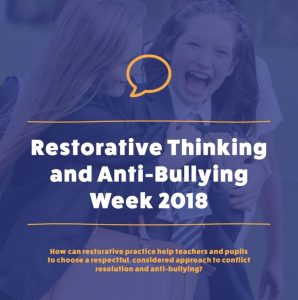
Restorative Practice: Dispelling the Myths
This short guide, produced with the Anti-Bullying Alliance, aims to provide schools with more information about what restorative practice is and to dispel some of the myths about restorative practice in response to bullying.
Download the resource via this link.
